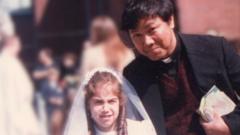Abuse survivors are expressing their concerns regarding the legacy of Pope Francis as 135 cardinals gather in Rome to discuss the future leadership of the Catholic Church. The sensitive issue of child sexual abuse within the clergy remains a predominant topic of conversation, with many victims feeling that Francis did not take sufficient action to address the crisis.
Alexa MacPherson, who endured abuse at the age of three by priest Peter Kanchong for six years, shared her traumatic experience which was revealed when her father caught Kanchong in a compromising situation. Following her father's report to the police, a court hearing was scheduled, but unbeknownst to them, the Church was working to protect Kanchong from scandal.
Reflecting on her wrenching memories, MacPherson acknowledges the abuse occurred long before Francis' papacy. Yet, the systemic exploitation of children issues remained unresolved, and she believes that Francis did not do enough during his tenure. "There’s just so much more that the Church and the Vatican can do," she lamented.
A letter written in 1984 by Archbishop Bernard Law revealed the Church's intentions to shield Kanchong from public scandal, despite internal evaluations indicating the priest was unresponsive to therapy. Instead of facing consequences, Kanchong was transferred back to his home diocese in Thailand—as the Church sought to contain the situation.
Years later, a Boston court's ruling compelled the Church to release numerous documents concerning abuse, contributing to the public exposure of decades of misconduct. Although progress was made under Francis' leadership, such as a 2019 bishops' conference which addressed abuse, critics argue that the Church maintained secrecy.
Lawyers representing survivors assert that while changes were made, they remain insufficient as the Church continues to cultivate an environment resistant to full transparency. MacPherson's call to action includes holding predatory priests accountable in civil courts rather than shielding them behind ecclesiastical laws.
As the Church prepares to announce a new pope, MacPherson feels hesitant about the possibility of real reform. "Until you truly acknowledge those sins, and you hold those people accountable, you cannot possibly bring people back into the fold," she stated, emphasizing the need for real change.
In the meantime, Kanchong, now 85 and still classified by the Church as "not yet resolved," remains at large, evading accountability—the shadow of the unresolved legacy of abuse haunting both victims and the Church itself.





















